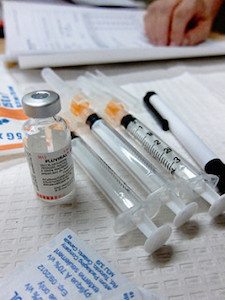
Flu prevention: Here’s how to have a flu-free season!
Coming down with the flu (seasonal influenza) may seem harmless, but in some situations it can actually be very dangerous. This is especially true if you are in the "at-risk category" which includes: older adults, children, pregnant women, and those with a weakened immune system. The Centers for Disease Control and Prevention (CDC) estimates that more than 200,000 people in the U.S. are hospitalized each year from flu-related complications. Fortunately, the flu shot and other flu preventive measures have proven effective, so you can start protecting yourself before flu season even begins.
Flu vaccine

Getting
a flu vaccine annually is one of the best flu prevention measures you can take.
The CDC recommends that every child and
adult age 6 months and older get a flu vaccination each season. You should make plans to get vaccinated early in the fall,
before flu season begins.
If you get the flu
According to the CDC, most people with the flu have mild illness and
do not need medical care or antiviral drugs. If you are sick with flu
symptoms you should stay at home and avoid contact with other people as much as
possible except to get medical care. If you have symptoms for the flu and
are in the high risk group, are very sick, or worried about your illness you
should contact your health care provider. Your health care provider may
prescribe an antiviral drug for you to take. Antiviral drugs can make illness
milder and shorten the time you are sick. They also can prevent serious flu
complications, like pneumonia. Studies have shown that flu antiviral
drugs work best if started within 2 days of getting sick. There are several antiviral
medications - such as Tamiflu, Relenza, Rapivab, and
Xofluza.
Reducing your risk
The best way to prevent seasonal flu is to get the flu shot, but good healthy habits like covering your cough and washing your hands can help stop the spread of germs. Follow the tip below to protect yourself and others from the flu and other illnesses:
- Avoid close contact with people who are sick. When you are sick, keep your distance from others to protect them from getting sick too.
- Stay at home when you are sick, if possible, unless you need medical care.
- Cover your mouth and nose when coughing or sneezing.
- Washing your hands often will help protect you from germs. If soap and water are not available, use an alcohol-based hand rub.
- Avoid touching your eyes, nose or mouth. Germs are often spread when a person touches something that is contaminated with germs and then touches his or her eyes, nose, or mouth.
- Clean and disinfect frequently touched surfaces at home, work or school, especially when someone is ill.
- Get plenty of sleep, be physically active, manage your stress, drink plenty of fluids, and eat nutritious food.
Getting the flu is never fun. If you do happen to come down with it though it's generally short lived. Most people start feeling better within one or two weeks.

